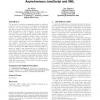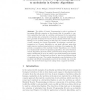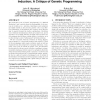99 search results - page 2 / 20 » On the Limiting Distribution of Program Sizes in Tree-Based ... |
GECCO
2000
Springer
13 years 9 months ago
2000
Springer
In earlier work we predicted program size would grow in the limit at a quadratic rate and up to fty generations we measured bloat O(generations1:2;1:5). On two simple benchmarks w...
GECCO
2007
Springer
13 years 11 months ago
2007
Springer
The success of a genetic programming system in solving a problem is often a function of the available computational resources. For many problems, the larger the population size an...
EUROGP
2007
Springer
13 years 11 months ago
2007
Springer
The ability of Genetic Programming to scale to problems of increasing difficulty operates on the premise that it is possible to capture regularities that exist in a problem environ...
EC
2006
13 years 5 months ago
2006
Genetic programming has highlighted the problem of bloat, the uncontrolled growth of the average size of an individual in the population. The most common approach to dealing with ...
GECCO
2009
Springer
13 years 12 months ago
2009
Springer
We revisit the roots of Genetic Programming (i.e. Natural Evolution), and conclude that the mechanisms of the process of evolution (i.e. selection, inheritance and variation) are ...



